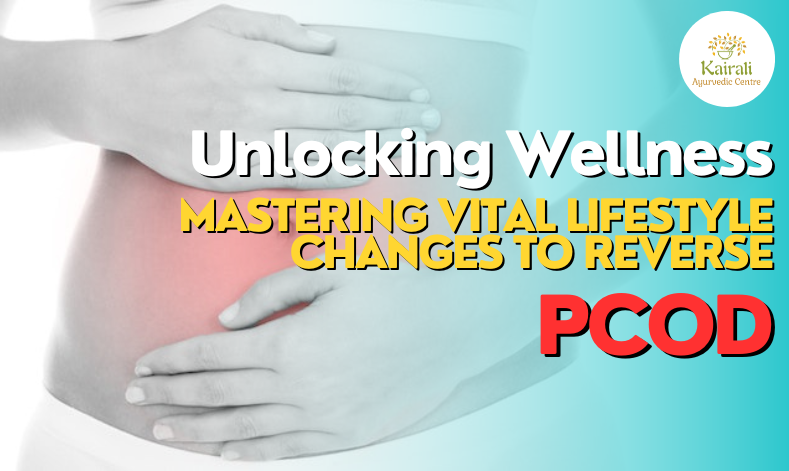A prevalent hormonal problem affecting women of reproductive age is polycystic ovarian disease (PCOD), often known as polycystic ovary syndrome (PCOS). Though its specific aetiology is still unknown, PCOD is thought to be the consequence of a confluence of genetic, hormonal, and environmental variables. Uncontrolled PCOD can result in a number of issues. Fortunately, lifestyle changes have proven to be quite beneficial in managing and even curing some of the PCOD symptoms. Continue reading to learn how to control PCOD and enhance general wellness.
Dietary Balance
For PCOD to be properly managed, a well-balanced and nutrient-rich diet is necessary. Consume entire foods including fruits, vegetables, whole grains, nuts, and seeds with the utmost priority. These nutrient-dense meals can enhance insulin sensitivity and hormonal balance. Including adequate fibre in your diet can also help you control your weight and lower inflammation. On the other hand, it’s critical to cut back on processed meals, sugary snacks, and refined carbs because these might make PCOD symptoms worse. To properly control blood sugar levels, take into consideration using a low glycaemic index diet.
Regular Workout
Regular exercise is crucial for controlling PCOD because it helps to regulate hormones and improve insulin sensitivity. Take part in exercises including Pilates, brisk walking, cycling, aerobics, dancing, swimming, and HIIT. Aim for at least 3–4 hours of moderate activity or 90–120 minutes of strenuous exercise each week. Exercises for strength training can help manage PCOD and improve general health.
Weight Control
For those with PCOD, maintaining a healthy weight is very crucial, especially if they are overweight or obese. By treating hormonal imbalances and insulin resistance, even a little amount of weight reduction can drastically reduce PCOD symptoms. For best results, combine weight loss efforts with toning workouts. A low-carb, high-fat diet and methods like intermittent fasting and brief fasting help hasten the process of losing weight.
Stress Management
Stress that persists over time may affect PCOD’s onset and progression. Use stress-reduction strategies in your everyday routine to properly treat PCOD. Stress levels can be decreased by engaging in activities like yoga, music therapy, video games, gardening, painting, meditation, deep breathing exercises, and pleasurable hobbies.
Sleep Quality
Managing PCOD requires getting adequate restorative sleep each night. Hormone balance and insulin production might be significantly impacted by sleep loss. Consider techniques like having a hot foot bath or shower before bed, abstaining from caffeine after 2 PM, and eating light and early dinners in order to improve the quality and length of sleep.
Limit Alcohol Consumption and give up Smoking
Smoking and excessive alcohol intake can worsen PCOD symptoms and be harmful to general health. Limiting alcohol use and giving up smoking can both help control PCOD and enhance overall quality of life.
Supplements
Certain herbal treatments and supplements have demonstrated potential in treating insulin resistance and PCOD. Supplements including ashwagandha, cimicifuga, black cohosh, berberis, inositol, vitamin D, and omega-3 fatty acids may be helpful for PCOD sufferers. To guarantee safety and efficacy, a healthcare practitioner must be consulted before beginning any supplements plan.
Yoga
There are several advantages to including yoga into your PCOD management strategy. Yoga, an age-old discipline that includes physical poses, breathing exercises, and meditation, has a number of positive health effects, including a reduction in stress, a promotion of relaxation, and a reduction in the detrimental effects of stress on PCOD symptoms. Additionally, some yoga poses and breathing techniques assist regulate hormones, which supports endocrine system balance. As insulin resistance leads to PCOD, frequent yoga practise can also improve insulin sensitivity, which is advantageous for PCOD sufferers. When paired with a balanced diet, more dynamic and intense versions of yoga help with weight management and fat loss. Additionally, yoga’s meditative components promote a positive outlook, lower anxiety, and enhance emotional wellbeing in general.
PCOD is a complicated and diverse condition that, in order to be effectively managed, necessitates a comprehensive strategy. As with any medical issue, it’s critical to speak with a healthcare provider to develop a customised strategy that best meets each person’s requirements and objectives.
📞 Call us today at 8826513700 to schedule your personalized consultation and take the first step towards a Healthy Life.
Disclaimer: This blog post is for informational purposes only and should not be considered as medical advice. Consult a qualified healthcare professional before starting any Ayurvedic treatment or making changes to your healthcare routine.

